集体名词
集体名词作主语

集体名词作主语1. 集体名词如:army,class,audience,enemy,family,crew,government,group,team,couple,party,union,public,nation,crowd,population,company,majority,committee等作主语时,如果强调的是整体,即把它看作一个整体,谓语动词常用单数;如果强调组成的个体,即把它看成其中的成分(个体),谓语动词常用复数形式。
2. 有些集体名词如:people,police,cattle,folk,youth(青年),poultry(家禽),vermin(害虫),militia (民兵)等作主语,谓语动词一般用复数形式。
3. 有些无生命的集体名词如equipment,furniture,machinery(机器),foliage(树叶),merchandise(货物)等在句中充当主语时,谓语动词一般用单数形式。
Much of her jewellery was stolen.Some of the furniture has been moved to another room.并列结构作主语1. and 连接的两个名词作主语,表示不同的人或事物,其概念是复数,句子谓语动词用复数形式。
The headmaster and the maths teacher are going to attend the meeting.What he said and what he did have greatly encouraged his brother.2. and 连接两个名词,指同一个人、同一件事或同一概念时,谓语动词用单数形式。
Our League secretary and monitor takes the lead in everything.My teacher and friend is a young girl.Bread and butter is served for breakfast.A knife and fork is on the table.3. and 后加no 或not 构成复合主语时,谓语动词用单数形式。
三类集体名词

集体名词集体名词在句中用作单数还是用作复数,后面该接单数形式的动词还是复数形式的动词,这些都应根据不同情况或意思加以处理。
下面将集体名词归纳为三类:Ⅰ类:这一类包括cattle(牛),folk(人们,亲属),people(人),police(警察),poultry(家禽),militia(民兵),mankind(人类),personnel(全体人员)等,其用法特点为:只有单数形式,但却表示复数意义,用作主语时谓语通常也用复数;不与a(n)连用,但可与the连用(表示总括意义和特指):1.Cattle were used as money in old days . 过去牛被当作钱用。
2. The town folk know him as Mr. Dick . 镇上的人们都知道他是迪克先生。
3.People are sure to laugh at you if you do that.如果你做那件事的话,人们肯定会嘲笑你的。
4.The police are searching for the missing papers.警察正在搜寻那些失踪的文件。
5.Their poultry are kept in the cages . 他们的家禽关在笼子里。
6. The militia are all out drilling for the May Day parade .民兵都出来操练准备五一节游行。
7. The mankind long for peace . 人类渴望和平。
8. State personnel have had this viewpoint drummed into them.国务院的工作人员被反复灌输这个观点。
Ⅱ类:这一类包括family(家庭),government (政府),team(队),class(班),public(公众),committee(委员会),school(学校),audience(听众),group(群,组),party(聚会,派队),club(俱乐部),crew(全体人员),crowd (群众), enemy(敌人), company(公司),population(人口)等,其用法特点为:若视为整体,表示单数意义;若考虑其个体成员,表示复数意义。
个体名词集体名词

个体名词:指单个人或物:he ,she集体名词:指一个团体:family,they物质名词:具体的东西: desk, cup抽象名词:不具体的东西:hope,dream个体名词指作为个体而存在的人或东西,可以指具体东西,如:She has three brothers.她有三个哥哥。
…也可指抽象的东西,如:He’s been here for a month.他在这里待一星期了。
…下面是一些常见的个体名词:accident account actor adult animal answerapartment article artist baby bag ball集体名词集体名词是由个体组成的集体的名称,下面是一些常见的集体名词:aristocracy army audience bacteria castcommittee community company council crewdata enemy family flock ganggovernment group herd jury medianavy nobility opposition police pressproletariat public staff team youth这些词本身有复数(注明者除外),带复数动词,表示多个集体。
单数集体名词有时作单数看待,有时作复数看待。
一般说来,作为整体时作单数看待,想到它包含的成员时作复数看待。
试比较下面句子:The public was unlikely to support it.公众支持它的可能性不大。
The public were deceived by the newspapers.公众受到报纸的蒙骗。
The enemy has suffered heavy losses.敌人受到重大损失。
The enemy were attacking the town.敌军正在攻打该城。
英语集体名词的概念

英语集体名词的概念
英语中的集体名词(Collective Nouns)是指用来表示一组人或物的单数名词。
这些名词通常指代一个整体,虽然它们所代表的实际成员可能是复数形式。
集体名词可以用于描述一群人的集合,如“team”(团队)、“family”(家庭)、“class”(班级),或者描述一批物品,如“furniture”(家具)、“clothing”(衣物)。
在英语中,集体名词的动词形式通常遵循主谓一致的原则。
如果强调的是群体作为一个整体,则使用单数动词;如果强调的是群体中的个体,则使用复数动词。
例如:
•The team is playing well. (强调整个团队的表现)
•The team are arguing with each other. (强调团队中的个别成员之间的争论)
值得注意的是,并非所有的集体名词都具有明确的个体化倾向,有些词汇更倾向于被视为不可分割的整体,因此总是与单数动词搭配。
这主要取决于具体的语境和作者的意图。
记住,英语语法规则可能因地区和语体的不同而有所差异,所以重要的是要熟悉你的目标受众所习惯的用法。
集体名词
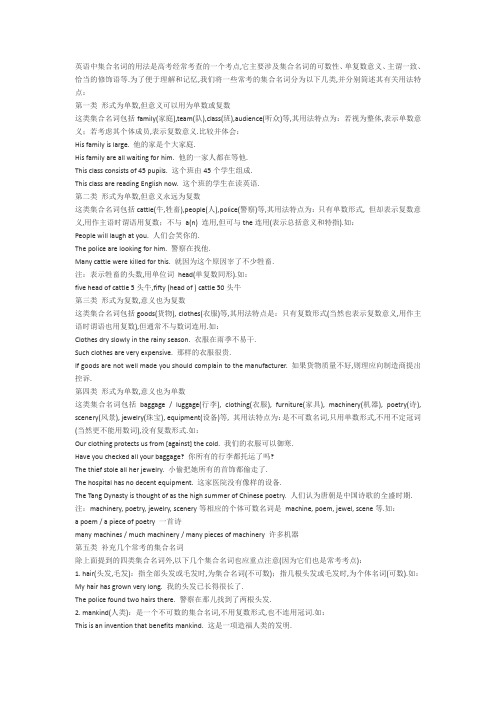
英语中集合名词的用法是高考经常考查的一个考点,它主要涉及集合名词的可数性、单复数意义、主谓一致、恰当的修饰语等.为了便于理解和记忆,我们将一些常考的集合名词分为以下几类,并分别简述其有关用法特点:第一类形式为单数,但意义可以用为单数或复数这类集合名词包括family(家庭),team(队),class(班),audience(听众)等,其用法特点为:若视为整体,表示单数意义;若考虑其个体成员,表示复数意义.比较并体会:His family is large. 他的家是个大家庭.His family are all waiting for him. 他的一家人都在等他.This class consists of 45 pupils. 这个班由45个学生组成.This class are reading English now. 这个班的学生在读英语.第二类形式为单数,但意义永远为复数这类集合名词包括cattle(牛,牲畜),people(人),police(警察)等,其用法特点为:只有单数形式, 但却表示复数意义,用作主语时谓语用复数;不与a(n) 连用,但可与the连用(表示总括意义和特指).如:People will laugh at you. 人们会笑你的.The police are looking for him. 警察在找他.Many cattle were killed for this. 就因为这个原因宰了不少牲畜.注:表示牲畜的头数,用单位词head(单复数同形).如:five head of cattle 5头牛,fifty (head of ) cattle 50头牛第三类形式为复数,意义也为复数这类集合名词包括goods(货物), clothes(衣服)等,其用法特点是:只有复数形式(当然也表示复数意义,用作主语时谓语也用复数),但通常不与数词连用.如:Clothes dry slowly in the rainy season. 衣服在雨季不易干.Such clothes are very expensive. 那样的衣服很贵.If goods are not well made you should complain to the manufacturer. 如果货物质量不好,则理应向制造商提出控诉.第四类形式为单数,意义也为单数这类集合名词包括baggage / luggage(行李), clothing(衣服), furniture(家具), machinery(机器), poetry(诗), scenery(风景), jewelry(珠宝), equipment(设备)等, 其用法特点为:是不可数名词,只用单数形式,不用不定冠词(当然更不能用数词),没有复数形式.如:Our clothing protects us from [against] the cold. 我们的衣服可以御寒.Have you checked all your baggage? 你所有的行李都托运了吗?The thief stole all her jewelry. 小偷把她所有的首饰都偷走了.The hospital has no decent equipment. 这家医院没有像样的设备.The Tang Dynasty is thought of as the high summer of Chinese poetry. 人们认为唐朝是中国诗歌的全盛时期. 注:machinery, poetry, jewelry, scenery等相应的个体可数名词是machine, poem, jewel, scene等.如:a poem / a piece of poetry 一首诗many machines / much machinery / many pieces of machinery 许多机器第五类补充几个常考的集合名词除上面提到的四类集合名词外,以下几个集合名词也应重点注意(因为它们也是常考考点):1. hair(头发,毛发):指全部头发或毛发时,为集合名词(不可数);指几根头发或毛发时,为个体名词(可数).如:My hair has grown very long. 我的头发已长得很长了.The police found two hairs there. 警察在那儿找到了两根头发.2. mankind(人类):是一个不可数的集合名词,不用复数形式,也不连用冠词.如:This is an invention that benefits mankind. 这是一项造福人类的发明.Mankind has its own problems. 人类有自己的问题.注:mankind 表示“人(类)”时,虽不可数,但有时却可以表示复数意义,尤其是当其表语是复数时.如:Mankind are intelligent animals. 人是理智的动物.3. fruit(水果):作为集合名词,它通常是不可数的.如:He doesn’t eat much fruit. 他不大吃水果.He is growing fruit in the country. 他在乡下种水果.但是,当要表示种类时,它可视为可数名词,即a fruit 指一种水果,fruits 指多种水果.比较:Some fruits have thick skins. 有些水果皮很厚.The potato is a vegetable, not a fruit. 土豆是一种蔬菜,而不是一种水果.。
集体名词总结
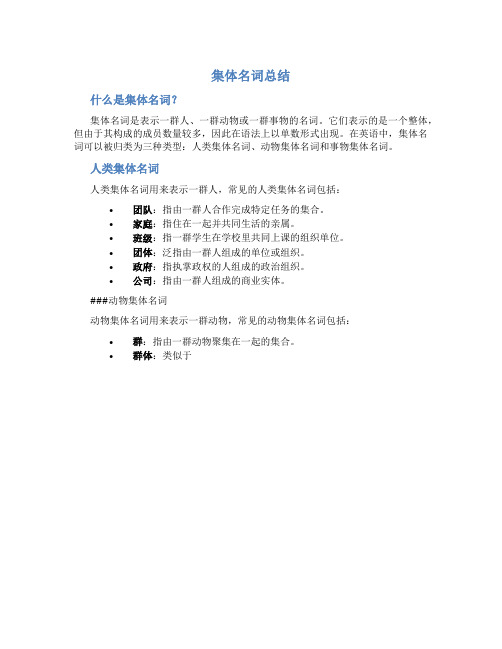
集体名词总结
什么是集体名词?
集体名词是表示一群人、一群动物或一群事物的名词。
它们表示的是一个整体,但由于其构成的成员数量较多,因此在语法上以单数形式出现。
在英语中,集体名词可以被归类为三种类型:人类集体名词、动物集体名词和事物集体名词。
人类集体名词
人类集体名词用来表示一群人,常见的人类集体名词包括:
•团队:指由一群人合作完成特定任务的集合。
•家庭:指住在一起并共同生活的亲属。
•班级:指一群学生在学校里共同上课的组织单位。
•团体:泛指由一群人组成的单位或组织。
•政府:指执掌政权的人组成的政治组织。
•公司:指由一群人组成的商业实体。
###动物集体名词
动物集体名词用来表示一群动物,常见的动物集体名词包括:
•群:指由一群动物聚集在一起的集合。
•群体:类似于。
集体名词作主语

集体名词作主语1. 集体名词如:army,class,audience,enemy,family,crew,government,group,team,couple,party,union,public,nation,crowd,population,company,majority,committee等作主语时,如果强调的是整体,即把它看作一个整体,谓语动词常用单数;如果强调组成的个体,即把它看成其中的成分(个体),谓语动词常用复数形式。
2. 有些集体名词如:people,police,cattle,folk,youth(青年),poultry(家禽),vermin(害虫),militia (民兵)等作主语,谓语动词一般用复数形式。
3. 有些无生命的集体名词如equipment,furniture,machinery(机器),foliage(树叶),merchandise(货物)等在句中充当主语时,谓语动词一般用单数形式。
Much of her jewellery was stolen.Some of the furniture has been moved to another room.并列结构作主语1. and 连接的两个名词作主语,表示不同的人或事物,其概念是复数,句子谓语动词用复数形式。
The headmaster and the maths teacher are going to attend the meeting.What he said and what he did have greatly encouraged his brother.2. and 连接两个名词,指同一个人、同一件事或同一概念时,谓语动词用单数形式。
Our League secretary and monitor takes the lead in everything.My teacher and friend is a young girl.Bread and butter is served for breakfast.A knife and fork is on the table.3. and 后加no 或not 构成复合主语时,谓语动词用单数形式。
集体名词
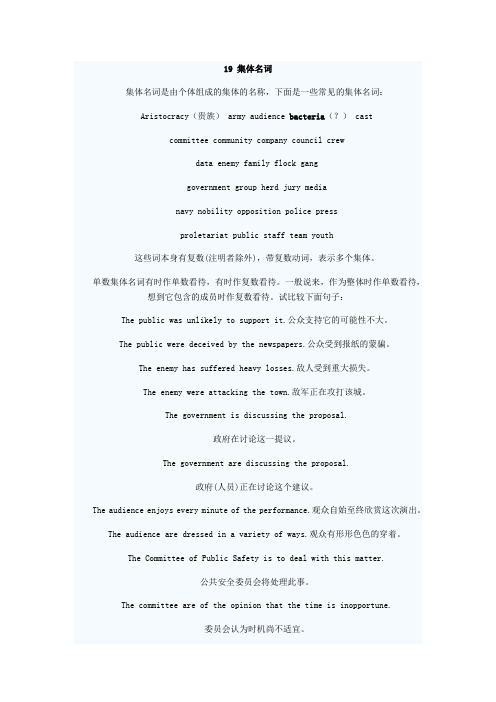
19 集体名词集体名词是由个体组成的集体的名称,下面是一些常见的集体名词:Aristocracy(贵族) army audience bacteria(?) castcommittee community company council crewdata enemy family flock ganggovernment group herd jury medianavy nobility opposition police pressproletariat public staff team youth这些词本身有复数(注明者除外),带复数动词,表示多个集体。
单数集体名词有时作单数看待,有时作复数看待。
一般说来,作为整体时作单数看待,想到它包含的成员时作复数看待。
试比较下面句子:The public was unlikely to support it.公众支持它的可能性不大。
The public were deceived by the newspapers.公众受到报纸的蒙骗。
The enemy has suffered heavy losses.敌人受到重大损失。
The enemy were attacking the town.敌军正在攻打该城。
The government is discussing the proposal.政府在讨论这一提议。
The government are discussing the proposal.政府(人员)正在讨论这个建议。
The audience enjoys every minute of the performance.观众自始至终欣赏这次演出。
The audience are dressed in a variety of ways.观众有形形色色的穿着。
The Committee of Public Safety is to deal with this matter.公共安全委员会将处理此事。
集体名词用法详解与相关主谓一致
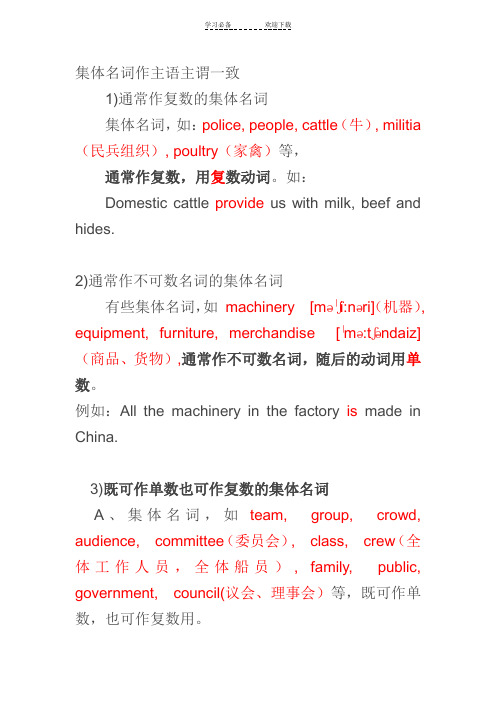
集体名词作主语主谓一致1)通常作复数的集体名词集体名词,如:police, people, cattle(牛), militia (民兵组织), poultry(家禽)等,通常作复数,用复数动词。
如:Domestic cattle provide us with milk, beef and hides.2)通常作不可数名词的集体名词有些集体名词,如machinery [məˈʃi:nəri](机器), equipment, furniture, merchandise [ˈmə:tʃəndaiz] (商品、货物),通常作不可数名词,随后的动词用单数。
例如:All the machinery in the factory is made in China.3)既可作单数也可作复数的集体名词A、集体名词,如team, group, crowd, audience, committee(委员会), class, crew(全体工作人员,全体船员), family, public, government, council(议会、理事会)等,既可作单数,也可作复数用。
The city council is meeting to set its agenda(日程). 练习:1. The class ________ (consist) twenty-five boys and twenty girls.2. The class ___________(do) experiments.B、由两部分组成的物质名称,如trousers(裤子), pants(裤子), jeans, compasses(指南针), glasses, shorts(短裤)等做主语时,谓语用复数These trousers _________( need wash)Your glasses ______ very nice.4)当集体名词被以下量词短语修饰时,A:a (the, this, that) kind /sort / type/form/portion(份额)/series/ species of +名词”或“a pair of, a large amount of, a committee of /a board of(一组)+ 名词”做主语,谓语用单数形式;但“these (those, all, many, some) kinds/sorts/types/forms /portions of ,two pairs of, large amounts of, quantities of + 名词”做主语,谓语则用复数形式。
集合名词(collective nouns)

• 集体名词通常只以单数形式出现,但这种 单数形式有的可作复数用。集体名词在句 中作单数用还是作复数用应根据不同情况 而定。
英语集合名词用法分类
• Type 1 • 形式为单数,但意义可以用为单数或复
数这类集合名词包括: • family (家庭)
• Crew, government, couple,
• 其用法特点为:是不可数名词,只用单数 形式,不用不定冠词(当然更不能用数词), 没有复数形式。如:
• Our clothing ts us from (against) the cold.
• 我们的衣服可以御寒。
• Have you checked all your baggage? • 你所有的行李都托运了吗?
• Type 2 形式为单数,但意义永远为复数这类集合 名词包括
• cattle (牛,牲畜) • poultry (家禽) • vermin (害鼠,害鸟 如:鼠,狐,猫头鹰) • people (人), • militia (民兵,国民自卫队) • police(警察)等
• 其用法特点为:只有单数形式, 但却表示复数意义, 用作主语时谓语用复数;不与 a(n) 连用,但可与 the连用(连用)。如:
• If goods are not well made you should complain to the manufacturer. 如果货物质量不好,则理应 向制造商提出控诉。
• Type 4 形式为单数,意义也为单数这类集合名词 包括
• baggage / luggage(行李), • clothing(衣服), • furniture(家具), • machinery(机器), • poetry(诗), • scenery (风景), • Jewelry (珠宝), • equipment(设备)等,
集体名词知识点总结

集体名词知识点总结一、集体名词的形式1. 集体名词通常是单数形式,但具体使用时可以与单数动词或复数动词连用。
例如:- The team is preparing for the match.(集体名词与单数动词连用)- The team are all very excited about the match.(集体名词与复数动词连用)2. 有些集体名词具有特殊的复数形式,表示多个组织或单位。
例如:- The police(警察)- The clergy(神职人员)3. 有些集体名词具有特殊的复数形式,表示多个成员。
例如:- The staff(职员)- The audience(观众)4. 有些集体名词具有两种形式,表示不同的概念。
例如:- family(家庭)与families(家庭成员)- club(俱乐部)与clubs(俱乐部会员)二、集体名词的用法1. 集体名词可以用来表示一组人或物的整体例如:- China is a large country.(中国是一个大国家。
)2. 集体名词可以用来表示一组人或物的个别成员例如:- The team is playing well.(整个团队表现良好。
)- The team are all in high spirits.(团队中的每个人都情绪高涨。
)3. 集体名词可以用来表示一组人或物的共同行为例如:- The jury has reached a verdict.(陪审团已经达成了裁决。
)4. 集体名词也可以用来表示一群人或物的数量例如:- A herd of cattle is grazing in the field.(一群牛正在草地上吃草。
)5. 集体名词有时也可以用来表示一组抽象概念例如:- The government is considering new policies.(政府正在考虑新的政策。
)三、常见的集体名词1. 团队(team)- The team is training for the match.- The team are all in high spirits.2. 家庭(family)- His family is going on vacation.- His family are all very supportive.3. 警察(police)- The police is investigating the case.- The police are patrolling the area.4. 神职人员(clergy)- The clergy is attending the conference.- The clergy are discussing church matters.5. 职员(staff)- The staff is working on the new project.- The staff are all very dedicated.6. 观众(audience)- The audience is enjoying the performance.- The audience are clapping and cheering.7. 政府(government)- The government is implementing new policies.- The government are facing public criticism.8. 集合名词(collection)- The collection of paintings is on display.- The collection are all from famous artists.9. 群(herd)- A herd of cattle is grazing in the field.- The herd are all moving towards the river.10. 联合国(United Nations)- The United Nations is promoting peace and development.- The United Nations are sending aid to the disaster area.11. 乐队(band)- The band is performing at the concert.- The band are all very talented musicians.12. 班级(class)- The class is starting a new project.- The class are all discussing their ideas.总结:集体名词是用来表示一组人或物的名词,它常用于表示整体、个别成员、共同行为、数量和抽象概念等方面。
集体名词_精品文档
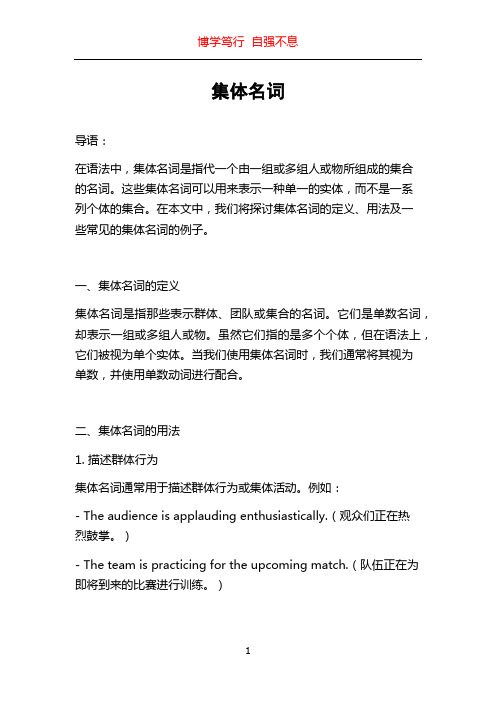
集体名词导语:在语法中,集体名词是指代一个由一组或多组人或物所组成的集合的名词。
这些集体名词可以用来表示一种单一的实体,而不是一系列个体的集合。
在本文中,我们将探讨集体名词的定义、用法及一些常见的集体名词的例子。
一、集体名词的定义集体名词是指那些表示群体、团队或集合的名词。
它们是单数名词,却表示一组或多组人或物。
虽然它们指的是多个个体,但在语法上,它们被视为单个实体。
当我们使用集体名词时,我们通常将其视为单数,并使用单数动词进行配合。
二、集体名词的用法1. 描述群体行为集体名词通常用于描述群体行为或集体活动。
例如:- The audience is applauding enthusiastically.(观众们正在热烈鼓掌。
)- The team is practicing for the upcoming match.(队伍正在为即将到来的比赛进行训练。
)2. 表示集体身份使用集体名词可以表示人们的身份,特别是当他们集体参与共同的活动时。
例如:- My family is going on vacation next week.(我家下周要去度假。
)- The committee is meeting to discuss the new proposal.(委员会正在开会讨论新的提案。
)3. 表示一类事物集体名词还可以表示一类事物的总体,而不是特指的个别事物。
例如:- The government is responsible for maintaining law and order.(政府负责维护法律和秩序。
)- The class is learning about ancient civilizations.(班上正在学习有关古代文明的知识。
)三、常见的集体名词例子以下是一些常见的集体名词的例子:1. 人群类:- crowd(人群): The crowd cheered as the band took the stage.(乐队登台时,人群欢呼。
汉语集体名词大全

汉语集体名词大全
汉语集体名词是指用来表示一群人或事物的名词,它们
可以用来描述一组具有相同特征或共同行动的个体。
下面
是一份汉语集体名词大全,包括了各个领域的常见集体名词。
1. 动物类:\n- 群:鱼群、鸟群、羊群\n- 羣:蚂蚁羣、蜜蜂羣\n- 羚:牛羚羣\n- 羯:鹿羯羣2. 人类类:
\n- 族:民族、家族\n- 伙:同伙、夥伴\n- 帮:帮派、
帮会\n- 派:使者派、代表派3. 植物类:\n- 林:树林、
森林\n- 丛:花丛、草丛\n- 茬:麦茬、菜茬4. 建筑类:
\n- 楼:大楼、楼房\n- 座:桥座、山座5. 车辆类:\n- 队:车队、队伍\n- 编队:飞机编队、舰艇编队6. 军事类:\n- 军团:军团部队\n- 营:连营部队7. 学校类:\n- 班:学生班、班级\n- 系:系部、系所8. 音乐类:\n- 合唱团:合唱团队\n- 乐团:交响乐团9. 体育类:\n- 队:球队、
运动队\n- 团:体操团、篮球团10. 组织类:\n- 会:会议、协会\n- 社:社团、社区11. 自然现象类:\n- 群:
云群、星群\n- 堆:云堆、雪堆12. 食物类:\n- 篮:果篮、菜篮子\n- 盘:菜盘、饭盘13. 家具类:\n- 套:家
具套装\n- 副:家具副件14. 服装类:\n- 套:西装套装
\n- 双:鞋双、袜双15. 工具类:\n- 副:工具副件\n- 把:刀把、伞把以上是一些常见的汉语集体名词,它们可
以帮助我们更准确地描述一群人或事物。
当我们需要描述
一组具有相同特征或共同行动的个体时,可以使用这些集
体名词来丰富我们的表达。
【语法知识】英语中的集体名词
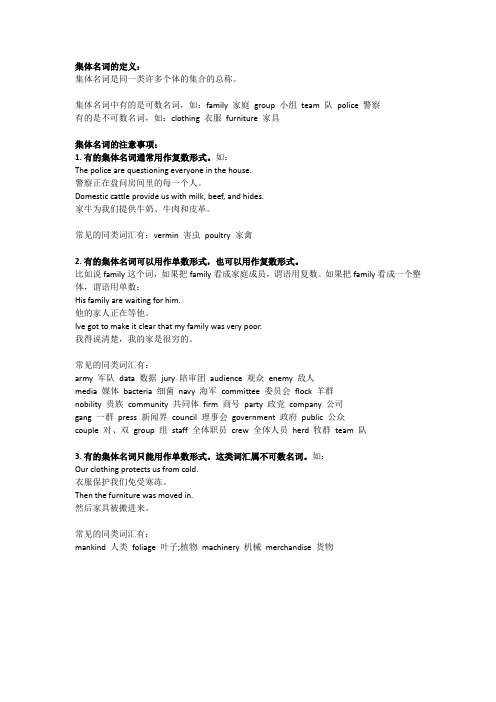
集体名词的定义:集体名词是同一类许多个体的集合的总称。
集体名词中有的是可数名词,如:family 家庭group 小组team 队police 警察有的是不可数名词,如:clothing 衣服furniture 家具集体名词的注意事项:1.有的集体名词通常用作复数形式。
如:The police are questioning everyone in the house.警察正在盘问房间里的每一个人。
Domestic cattle provide us with milk, beef, and hides.家牛为我们提供牛奶、牛肉和皮革。
常见的同类词汇有:vermin 害虫poultry 家禽2.有的集体名词可以用作单数形式,也可以用作复数形式。
比如说family这个词,如果把family看成家庭成员,谓语用复数。
如果把family看成一个整体,谓语用单数:His family are waiting for him.他的家人正在等他。
Ive got to make it clear that my family was very poor.我得说清楚,我的家是很穷的。
常见的同类词汇有:army 军队data 数据jury 陪审团audience 观众enemy 敌人media 媒体bacteria 细菌navy 海军committee 委员会flock 羊群nobility 贵族community 共同体firm 商号party 政党company 公司gang 一群press 新闻界council 理事会government 政府public 公众couple 对、双group 组staff 全体职员crew 全体人员herd 牧群team 队3.有的集体名词只能用作单数形式。
这类词汇属不可数名词。
如:Our clothing protects us from cold.衣服保护我们免受寒冻。
集体名词的数
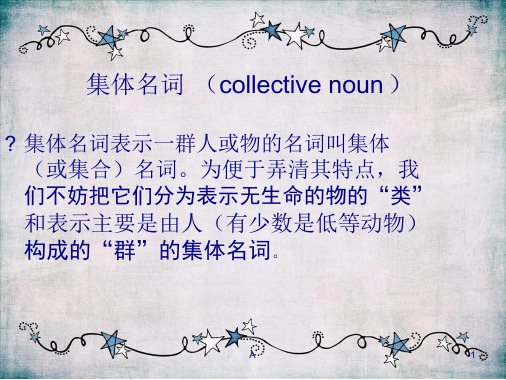
3. 若需用代词,用单数代词。 如: Do you want to see my jewelry?It is in the box.
A
3
? 表示群的集体名词常见的有 1.people,police,cattle , poultry( 家禽 ),vermin( 害
谓语
? 4. the number of ,the variety of+ 复数名词 +单数谓语
A
9
练习
? 1.In summer,my family always _ e_ats _(eat) lunch in the
park.
? 2.At the moment,the whole class __ is enjoying __(enjoy)sightseeing trips in the city.
数形式。
? 如:
? This kind of book is useful for us. ? Many kinds of shoes are on sale in that shop.
A
8
? 2.a quantity of +名词,分数、百分数做主语,谓语单复数
由名词定。
? 3. a number of ,a variety of, a group of +复数名词 +复数
all famous footballers.
? 他参加了一个队员全是著名足球选手的那个足球队
A
6
集体名词的数记忆口诀
? 人们、警察、家庭、队、组,
? 人群、牛群”,都是集体。
? 强调整体,用作单数, ? 强调成员,当成复数。 ? 变来变去,形式单数
1)通常作复数的集体名词
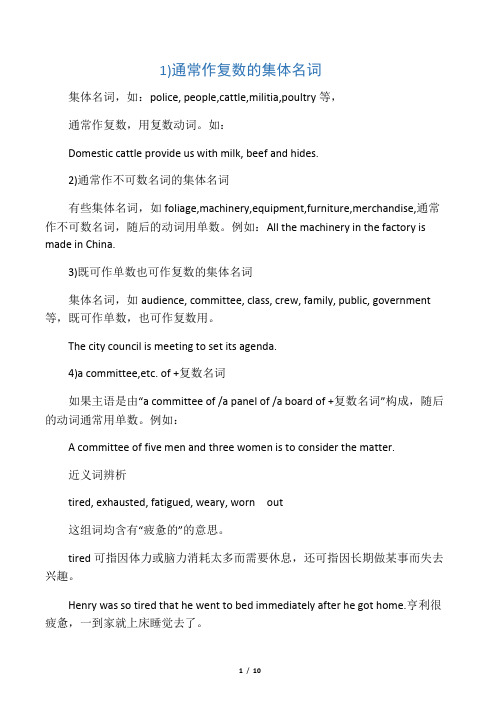
1)通常作复数的集体名词集体名词,如:police, people,cattle,militia,poultry等,通常作复数,用复数动词。
如:Domestic cattle provide us with milk, beef and hides.2)通常作不可数名词的集体名词有些集体名词,如foliage,machinery,equipment,furniture,merchandise,通常作不可数名词,随后的动词用单数。
例如:All the machinery in the factory is made in China.3)既可作单数也可作复数的集体名词集体名词,如audience, committee, class, crew, family, public, government 等,既可作单数,也可作复数用。
The city council is meeting to set its agenda.4)a committee,etc. of +复数名词如果主语是由“a committee of /a panel of /a board of +复数名词”构成,随后的动词通常用单数。
例如:A committee of five men and three women is to consider the matter.近义词辨析tired, exhausted, fatigued, weary, worn out这组词均含有“疲惫的”的意思。
tired可指因体力或脑力消耗太多而需要休息,还可指因长期做某事而失去兴趣。
Henry was so tired that he went to bed immediately after he got home.亨利很疲惫,一到家就上床睡觉去了。
exhausted表达的疲惫程度最强,指因劳累过度而精疲力竭。
Theexhaustedengineerfellasleeponthebus.精疲力竭的工程师在公共汽车上睡着了。
名词

1. 集体名词:family, class, team, staff, crew, population, government, majority, school, audience, the public等。
看做一个整体,用单数。
看做整体中的每个成员,用复数。
The team takes the bus.The team get regular physical exams.The population in India is increasing rapidly.Thirty percent of the population here are workers.有些集体名词永远用复数:people, police, youth, cattleThe police say they have caught the thieves.2.有两个部分组成名词,通常用复数:glasses, trousers, shoes, chopsticks, scissors, clothes但如果前面有a kind of, a pair of, a series of等,用单数My glasses were on the bed.A pair of blue trousers is in the closet.注意:glass-- a glass of water my glasses the glass of the windowschicken-- n.u. 鸡肉n.c. 小鸡,鸡,胆小鬼keep chickensfish-- n.u. 鱼肉或加工过的鱼fried fishn.c. 鱼(单复同形)或者加es two fish(es)n.c. 鱼的种类many fishes3. 一些词以s结尾,但是意义为不可数,主要是一些学科名词,用单数:news, measles, mathematics, physics, politics, mechanics等Economics is his major.No news is good news.4.时间、距离、价值等名词做主语(看作整体),一般用单数Ten weeks is the period of the first term.Ten weeks have passed since he went away.Six thousand dollars is a large sum of money to her.5.单复同形的单词:sheep, deer, meansevery means, several means6.主语是名词,动名词,不定式,用单数。
常见单数类集体名词
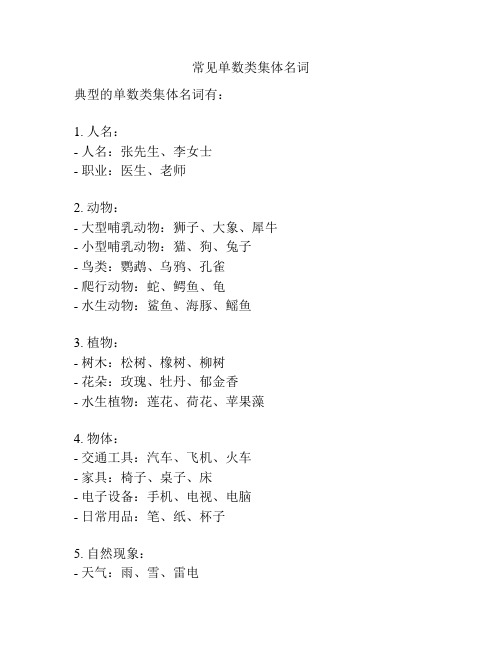
常见单数类集体名词典型的单数类集体名词有:
1. 人名:
- 人名:张先生、李女士
- 职业:医生、老师
2. 动物:
- 大型哺乳动物:狮子、大象、犀牛
- 小型哺乳动物:猫、狗、兔子
- 鸟类:鹦鹉、乌鸦、孔雀
- 爬行动物:蛇、鳄鱼、龟
- 水生动物:鲨鱼、海豚、鳐鱼
3. 植物:
- 树木:松树、橡树、柳树
- 花朵:玫瑰、牡丹、郁金香
- 水生植物:莲花、荷花、苹果藻
4. 物体:
- 交通工具:汽车、飞机、火车
- 家具:椅子、桌子、床
- 电子设备:手机、电视、电脑
- 日常用品:笔、纸、杯子
5. 自然现象:
- 天气:雨、雪、雷电
- 自然灾害:地震、台风、洪水
6. 抽象概念:
- 情感:爱、恨、快乐
- 性格:善、恶、聪明
这只是一部分常见的单数类集体名词,还有许多其他的单数类集体名词。
- 1、下载文档前请自行甄别文档内容的完整性,平台不提供额外的编辑、内容补充、找答案等附加服务。
- 2、"仅部分预览"的文档,不可在线预览部分如存在完整性等问题,可反馈申请退款(可完整预览的文档不适用该条件!)。
- 3、如文档侵犯您的权益,请联系客服反馈,我们会尽快为您处理(人工客服工作时间:9:00-18:30)。
1集体名词
表示一群人或物的名词叫集体(或集合)名词。
为便于弄清其特点,我们不妨把它们分为表示无生命的物的“类”和表示主要是由人(有少数是低等动物)构成的“群”的集体名词。
⑴表示“类”的集体名词,常见的有
clothing
furniture
baggage/luggage
jewelry
traffic
infomation
machinery
merchandise
produce
scenery
它们指同一类的许多东西,其用法与不可数名词相当:
①形式上总是单数,没有复数形式,作主语时,谓语用单数。
如:
The old machinery is out of date.
这些旧机器过时了。
②不可直接与a(n)或数词连用。
表数量时用much,little,some,a piece of,an article of等。
如:
Each room has five pieces of furniture.
每个房间有五件家具。
③若需用代词,用单数代词。
如:
Do you want to see my jewelry?It is in the box.
你想看我的珠宝吗?它在我的箱子里。
⑵表示“群”的集体名词常见的有
(Ⅰ)
people
police
cattle
poultry
vermin
clergy
militia
(Ⅱ)
family
class
team
government
crowd
committee
crew
jury
party
firm
couple
board
group
gang
enemy
union
audience
public
mankind
humanity
youth
▲上述(Ⅰ)部分的词作主语时,谓语动词通常用复数。
如:
The police are looking for him.
警察当局正在找他。
▲▲上述(Ⅱ)部分的词把集体当作一个整体时,用作单数;若考虑构成这些集体的各个成员时,看作复数。
如:
My family is a large one.
我家是个大家庭。
My family are all workers.
我的家人都是工人。
▲▲▲上述(Ⅰ)部分的词以及public,church,audience,mankind,humanity等通常只有单数形式,也不能直接加a(n)(audience除外);其中clergy,public,church,youth,police等的前面通常要加the。
▲▲▲▲把一个集体名词看作单数或复数,要注意前后一致。
如:
The team is famous for its(不能用their) long history.
该对以历史悠久而闻名。
He has joined the football team who are (不可用which is) all famous footballers.
他参加了一个队员全是著名足球选手的那个足球队。
